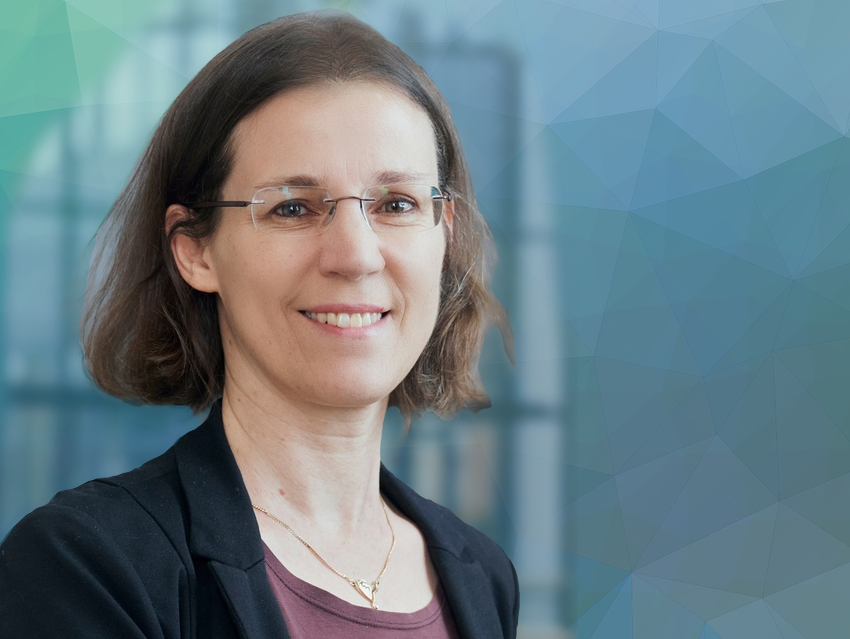Professor Stefanie Dehnen, Karlsruhe Institute of Technology (KIT), Germany, has been elected President of the German Chemical Society (GDCh) for the years 2024 and 2025. She succeeds Professor Karsten Danielmeier, Covestro AG, Leverkusen, Germany, who will assume the role of Vice President. In addition, Sabine Becker, Junior Professor at Rheinland-Pfälzische Technische Universität Kaiserslautern-Landau, Germany, has been elected as Vice President for 2024 and 2025.
During her presidency, Stephanie Dehnen intends to improve communication with diverse chemistry-related groups, enhance public engagement with information about chemistry, and make the GDCh more international and inclusive. “For me, the GDCh plays the role of a ‘society for society’,” she explains. “This includes, on the one hand, the mission to enhance communication among all groups associated with chemistry, to interact with non-chemical professional societies, and to provide the general public with important information about chemical issues. On the other hand, it also means that the GDCh is opening up further and becoming more international, modern, youthful, and diverse. We are on the path to a new era—’Rethinking Chemistry’ also means ‘Rethinking GDCh’.” Rethinking Chemistry is the motto of the GDCh.
Stefanie Dehnen, born 1969 in Gelnhausen, Germany, studied chemistry at the University of Karlsruhe (today’s KIT), Germany, where she received her Ph.D. in 1996. After postdoctoral research in theoretical chemistry at the same university, she completed her habilitation in inorganic chemistry there in 2004. From 2006 to 2022, she held the position of Professor of Inorganic Chemistry at Philipps-Universität Marburg, Germany, and served as the Director at the Scientific Center for Materials Science (from 2012 to 2014, she also served as the Managing Director). Since 2022, she has been a Professor of Information-Based Material Design and Nanosciences and currently serves as the Managing Director of the Institute of Nanotechnology at KIT.
Stefanie Dehnen is an Elected Member and Spokesperson of the Review Board “Molecular Chemistry” of the German Research Foundation (DFG) and serves as Editor-in-Chief of the journal Inorganic Chemistry. She holds positions on several editorial boards and is a Member of numerous national and international academies, including the German National Academy of Sciences Leopoldina and the European Academy of Sciences.
Stefanie Dehnen has received numerous awards, including the Gottfried Wilhelm Leibniz Prize from the DFG in 2022 and the Alfred Stock Memorial Prize (now Marianne Baudler Prize) from the GDCh. In 2022, she was awarded an ERC Advanced Grant from the European Research Council.
She has been an active member of the GDCh’s board since 2020, serving as Vice President in 2020 and 2021, and was a Board Member of the Wöhler Association for Inorganic Chemistry of the GDCh from 2014 to 2022 (serving as Chair from 2018 to 2022).
Selected Publications
- Synthesis and Characterization of Homoleptic Zintl Anions [(Pn7)M(Pn7)]4− (M/Pn=Pb/As, Zn/Bi),
Fuxing Pan, Rodica Ababei, Werner Massa, Stefanie Dehnen,
Eur. J. Inorg. Chem. 2023.
https://doi.org/10.1002/ejic.202300514 - Selective and benign alkylation of sulfido-oxo stannate clusters with propyl, pentyl, or hexyl substituents,
Gina Stuhrmann, Jannik Schneider, Kilian Schmidt, Stefanie Dehnen,
Chem. Commun. 2023, 59, 13171–13174.
https://doi.org/10.1039/d3cc03525e - Ligand-functionalized and ligand-bridged or organyl-separated chalcogenido metalate-based clusters,
Zhou Wu, Mirko Tallu, Gina Stuhrmann, Stefanie Dehnen,
Coord. Chem. Rev. 2023, 497, 215424.
https://doi.org/10.1016/j.ccr.2023.215424 - Vacancy‐Controlled Na+ Superion Conduction in Na11Sn2PS12,
Marc Duchardt, Uwe Ruschewitz, Stefan Adams, Stefanie Dehnen, Bernhard Roling,
Angew. Chem. Int. Ed. 2018, 57, 1351–1355.
https://doi.org/10.1002/anie.201712769 - Li10SnP2S12: An Affordable Lithium Superionic Conductor,
Philipp Bron, Sebastian Johansson, Klaus Zick, Jörn Schmedt auf der Günne, Stefanie Dehnen, Bernhard Roling,
J. Am. Chem. Soc. 2013, 135, 15694–15697.
https://doi.org/10.1021/ja407393y - Chalcogenide clusters of copper and silver from silylated chalcogenide sources,
Olaf Fuhr, Stefanie Dehnen, Dieter Fenske,
Chem. Soc. Rev. 2013, 42, 1871–1906.
https://doi.org/10.1039/c2cs35252d - New Lithium Chalcogenidotetrelates, LiChT: Synthesis and Characterization of the Li+-Conducting Tetralithium ortho-Sulfidostannate Li4SnS4,
Thomas Kaib, Sima Haddadpour, Manuel Kapitein, Philipp Bron, Cornelia Schröder, Hellmut Eckert, Bernhard Roling, Stefanie Dehnen,
Chem. Mater. 2012, 24, 2211–2219.
https://doi.org/10.1021/cm3011315 - A coordination chemistry approach towards ternary M/14/16 anions,
Stefanie Dehnen, Maike Melullis,
Coord. Chem. Rev. 2007, 251, 1259–1280.
https://doi.org/10.1016/j.ccr.2006.11.003
Also of Interest
- Video: I Love Complicated Questions,
ChemistryViews 2021.
Stefanie Dehnen about her research, networking, how to run a successful research team, and the self-image of chemists
https://doi.org/10.1002/chemv.202100082 - Event Highlight: Rethinking Chemistry—WiFo 2023,
ChemistryViews 2023.
We need to broaden our perspective, look at chemistry from a new angle, and strengthen the interactions between the different disciplines
https://doi.org/10.1002/chemv.202300065 - Video: Stefanie Dehnen on the Fascination of Cluster Chemistry,
ChemistryViews 2019.
Stefanie Dehnen, University of Marburg, Germany, explains her research focus
https://doi.org/10.1002/chemv.201900044




